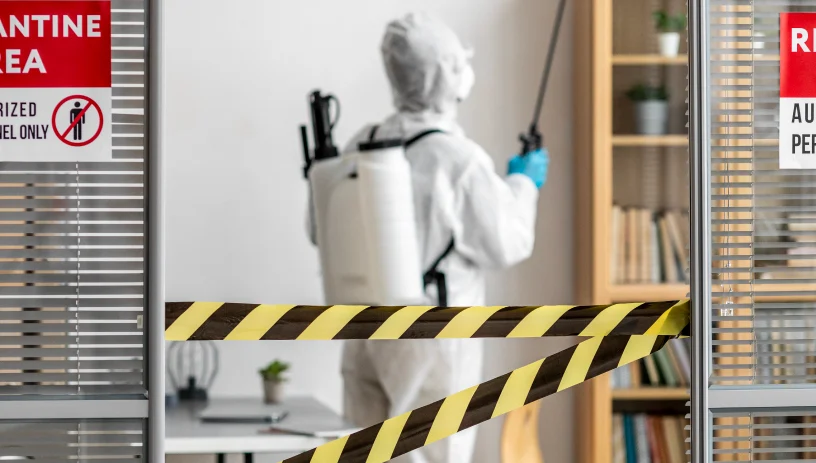Forensic cleaning, also known as biohazard remediation, is a specialised cleaning service that involves the safe and thorough removal of biohazardous materials from crime scenes, trauma incidents, and other environments where biological contaminants are present. This service is crucial for restoring safety, cleanliness, and normality to affected areas.
What is Forensic Cleaning?
This specialised cleaning cleaning encompasses the meticulous decontamination and sanitisation of areas exposed to blood, bodily fluids, and other potentially infectious materials. These situations can arise from various incidents, including:
- Crime scenes
- Accidents
- Suicides
- Homicides
- Unattended deaths
Professionals in this specialised cleaning service are trained to handle these materials safely and dispose of them in accordance with health regulations.
Why is Forensic Cleaning Important?
Health and Safety: Exposure to biohazardous materials can pose significant health risks, including infections and diseases. Forensic cleaning ensures that all traces of these materials are removed, reducing the risk of contamination.
Legal Compliance: Proper forensic cleaning is required to comply with health and safety regulations. Failure to do so can result in legal consequences and endanger public health.
Psychological Relief: For those affected by traumatic incidents, the sight of a crime scene or accident site can be distressing. Forensic cleaning helps in providing psychological relief by restoring the environment to a clean and sanitary state.
You may also like Warehouse Cleaning & 5 Essential Components
6 Essential Facts About Forensic Cleaning Process
- Assessment: The first step involves a thorough assessment of the affected area to determine the extent of contamination and the necessary cleaning procedures.
- Containment: The area is contained to prevent the spread of biohazardous materials to unaffected areas.
- Removal: All visible biohazardous materials are safely removed using specialised equipment and protective gear.
- Cleaning and Disinfection: The area is then cleaned and disinfected using hospital-grade cleaning agents to ensure complete decontamination.
- Deodorisation: Any lingering odours are neutralised to restore a pleasant environment.
- Disposal: All biohazardous waste is disposed of in compliance with local regulations.
Choosing a Cleaning Service
When selecting a forensic cleaning service, consider the following:
- Certification and Training: Ensure the service provider has the necessary certifications and training to handle biohazardous materials safely.
- Experience: Look for a company with a proven track record in forensic cleaning. Experienced professionals are better equipped to handle complex cleaning scenarios.
- Compassion and Discretion: This specialised cleaning often involves sensitive situations. Choose a service that demonstrates compassion and discretion while performing their duties.
- Availability: Emergencies can happen at any time. Select a forensic cleaning service that offers 24/7 availability to respond promptly when needed.
This specialised cleaning is a vital service that ensures the safety and well-being of individuals and communities. By hiring professional forensic cleaners, you can trust that contaminated areas will be thoroughly and safely restored, allowing you to focus on recovery and healing.


